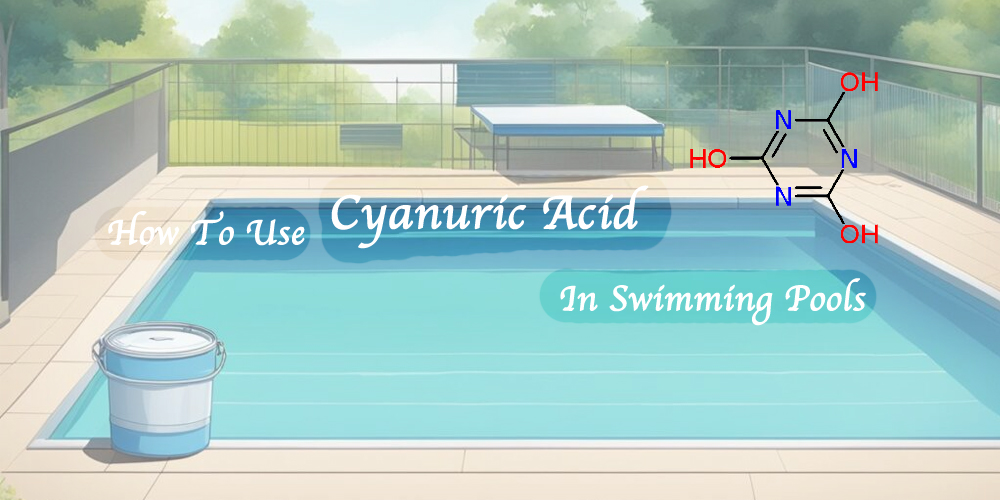Cyanuric acid (C3H3N3O3), also known as the chlorine stabilizer, is widely used in outdoor swimming pools to stabilize chlorine. cyanuric acid slows down the degradation of chlorine in water and prevents chlorine from becoming ineffective due to sunlight exposure. In this way, cyanuric acid helps maintain the chlorine level in the water and ensures the continuous cleaning and disinfection of water quality.
The role of cyanuric acid in swimming pools
1. Stabilize chlorine: Chlorine disinfectants (TCCA, SDIC, calcium hypochlorite, etc.) are commonly used disinfectants in swimming pools to kill bacteria, algae and viruses in water. However, chlorine degrades rapidly under sunlight, resulting in a weakening of its disinfection effect. Cyanuric acid protects chlorine from ultraviolet damage by reacting with chlorine, extending its effectiveness in water. In this way, the chlorine content in the swimming pool can be maintained at a reasonable level under sunlight, ensuring the health of swimmers and reducing chlorine waste and the frequency of water replenishment.
2. Help control algae growth: By stabilizing the level of chlorine, cyanuric acid indirectly helps control the growth of algae in swimming pools. Chlorine is the main component of disinfection and algae prevention, and the presence of cyanuric acid allows chlorine to work effectively, thereby inhibiting the reproduction of algae.
How to use cyanuric acid in swimming pools?
1. Determine the required cyanuric acid level
When using cyanuric acid, you first need to understand the actual situation of the swimming pool and determine the required cyanuric acid level. Generally speaking, the cyanuric acid level in swimming pool water should be maintained at 40-80 ppm. This level range can effectively protect chlorine from being destroyed by ultraviolet rays and maintain sufficient disinfection effect. Too high the cyanuric acid level may cause the effectiveness of chlorine to decrease and even affect the water quality of the swimming pool, so it needs to be adjusted according to the specific situation.
If the disinfectant used in the swimming pool is calcium hypochlorite or other disinfectants that do not contain cyanuric acid, the amount of cyanuric acid to be used for the first use needs to be calculated based on the volume of the swimming pool and the required cyanuric acid level.
2. How to add cyanuric acid
Usually, cyanuric acid tablets can be dissolved in a dedicated doser or dissolving device and added to the swimming pool water. If you are using granules, be careful not to sprinkle the cyanuric acid granules directly into the pool water when adding it.
3. Regularly monitor cyanuric acid level
The level of cyanuric acid will change over time and with the use of the pool water, so it is necessary to test the cyanuric acid level in the water regularly. Using a dedicated pool water test reagent or test paper, the cyanuric acid level can be easily detected. If the level is too high, it can be reduced by partially changing the water; if the level is too low, it is necessary to supplement cyanuric acid in an appropriate amount.
Precautions when using cyanuric acid
1. Avoid excessive use
Although cyanuric acid plays an important role in swimming pool water treatment, excessive use may affect the disinfection effect of chlorine. Too high the cyanuric acid level can cause a “chlorine lock” phenomenon, which prevents chlorine from achieving optimal disinfection effects. Therefore, when using cyanuric acid, be sure to add it strictly according to the recommended dosage and test the cyanuric acid level regularly.
2. When using cyanuric acid, be sure to follow the product instructions to ensure safe use.
3. Storage conditions
Cyanuric acid should be stored in a place away from heat to ensure its stability.
How to reduce the cyanuric acid level in pool water?
If the cyanuric acid level in the pool water is too high, it can be reduced by the following method:
Refreshing water: Drain a portion of the pool water and add fresh water.
FAQs about Cyanuric Acid
Is cyanuric acid harmful to the human body?
An appropriate amount of cyanuric acid has little effect on human health, but may irritate the skin and eyes.
Does cyanuric acid pollute the environment?
Cyanuric acid is not easy to degrade, and excessive discharge will pollute the water body.
What is the difference between cyanuric acid and chlorine?
Cyanuric acid is a stabilizer for chlorine, while chlorine is a bactericidal disinfectant.
As a professional manufacturer of swimming pool chemicals, we recommend that swimming pool owners and maintenance personnel use cyanuric acid in a reasonable manner based on specific circumstances. Our products are of stable quality and easy to use, providing efficient support for your swimming pool management. For more information about swimming pool chemicals, please visit our official website www.xingfeichemical.com.
Post time: Dec-23-2024

